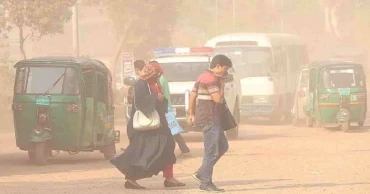polluted city
Dhaka’s air 5th most polluted in the world this morning
Dhaka’s air was ranked 5th most polluted among cities around the world this morning (August 14, 2023), according to the Air Quality Index (AQI).
The air in Dhaka city was categorised as ‘unhealthy for sensitive groups’, with an AQI score of 136 at 8:30 am.
Uganda’s Kampala, United Arab Emirates’ Dubai, Kuwait’s Kuwait City and Indonesia’s Jakarta occupied the first four spots on the list, with AQI scores of 162, 159, 157 and 152 respectively.
Read: Thanks to rain, Dhaka's air quality 'moderate' this morning
When the AQI value for particle pollution is between 101 and 150, air quality is considered ‘unhealthy for sensitive groups’, between 150 and 200 is ‘unhealthy’, between 201 and 300 is said to be 'very unhealthy', while a reading of 301+ is considered 'hazardous', posing serious health risks to residents.
In Bangladesh, the AQI is based on five criteria pollutants — particulate matter (PM10 and PM2.5), NO2, CO, SO2, and Ozone.
Dhaka has long been grappling with air pollution issues. Its air quality usually turns unhealthy in winter and improves during the monsoon.
Read: Dhaka’s air unhealthy for sensitive groups this morning
Air pollution consistently ranks among the top risk factors for death and disability worldwide.
As per the World Health Organization (WHO), air pollution kills an estimated seven million people worldwide every year, largely due to increased mortality from stroke, heart disease, chronic obstructive pulmonary disease, lung cancer, and acute respiratory infections.
Read more: Dhaka’s air 3rd most polluted in the world this morning
2 years ago
Dhaka ranks world’s 4th most polluted city this morning
With an air quality index (AQI) score of 154 at 8:30am on Thursday (June 01, 2023), Dhaka ranked 4th on the list of cities worldwide having the worst air quality.
China’s Beijing, India's Delhi and Chile’s Santiago occupied the first three spots in the list, with AQI scores of 170, 160, and 155, respectively.
The air was classified as 'unhealthy', according to the air quality and pollution city ranking.
An AQI between 151 and 200 is considered 'unhealthy' while 201-300 is 'very unhealthy', and 301-400 is considered 'hazardous', posing severe health risks to residents.
Read more: UN talks on a treaty to end global plastic pollution open in Paris
The AQI, an index for reporting daily air quality, informs people how clean or polluted the air of a certain city is and what associated health effects might be a concern for them.
The AQI in Bangladesh is based on five pollutants: particulate matter (PM10 and PM2.5), NO2, CO, SO2, and ozone.
Dhaka has long been grappling with air pollution issues. Its air quality usually turns unhealthy in winter and improves during the monsoon.
As per World Health Organization (WHO), air pollution kills an estimated seven million people worldwide every year, mainly due to increased mortality from stroke, heart disease, chronic obstructive pulmonary disease, lung cancer, and acute respiratory infections.
Read more: Combating Marine Pollution: Dhaka lauds Delhi’s initiative in drawing global attention
2 years ago
AQI: Dhaka’s air 2nd most polluted in the world this morning
Dhaka's air quality continued to be in the 'unhealthy' zone on Wednesday (May 31, 2023) morning.
With an air quality index (AQI) score of 166 at 8:41 am on Wednesday, Dhaka ranked second in the list of cities worldwide with the worst air quality.
An AQI between 151 and 200 is considered ‘unhealthy'.
Indonesia’s Jakarta and Chile’s Santiago occupied the first and third spots in the list, with AQI scores of 173 and 157, respectively.
Also read: Dhaka’s air quality ‘unhealthy’ Friday morning
An AQI between 201 and 300 is said to be 'very unhealthy', while a reading of 301 to 400 is considered 'hazardous', posing serious health risks to residents.
In Bangladesh, the AQI is based on five criteria pollutants -- Particulate Matter (PM10 and PM2.5), NO2, CO, SO2 and Ozone.
Dhaka has long been grappling with air pollution issues.
As per the World Health Organization (WHO), air pollution kills an estimated seven million people worldwide every year, largely as a result of increased mortality from stroke, heart disease, chronic obstructive pulmonary disease, lung cancer and acute respiratory infections.
Read more: UN talks on a treaty to end global plastic pollution open in Paris
2 years ago
Dhaka air 'very unhealthy', 2nd most polluted in the world this morning
Dhaka’s air quality remained in the 'very unhealthy' zone this morning. With an air quality index (AQI) score of 215 at 11:30 am, the capital of Bangladesh ranked second in the list of cities worldwide with the worst air quality.
India’s Delhi and Pakistan’s Lahore occupied the first and third spots, with AQI of 249 and 201 respectively.
Also read: Dhaka air 2nd most polluted in the world this morning
An AQI between 101 and 200 is considered 'unhealthy', particularly for sensitive groups, and an AQI between 201 and 300 is said to be 'poor', while a reading of 301 to 400 is considered 'hazardous', posing serious health risks to residents.
AQI, an index for reporting daily air quality, is used by government agencies to inform people how clean or polluted the air of a certain city is, and what associated health effects might be a concern for them.
In Bangladesh, the AQI is based on five criteria pollutants -- Particulate Matter (PM10 and PM2.5), NO2, CO, SO2 and Ozone.
Read More: Air pollution 2nd biggest cause of deaths in Bangladesh in 2019, cost about 3.9-4.4% of GDP: World Bank
3 years ago
Dhaka’s air quality is ‘unhealthy’
Dhaka is no longer the world's most polluted city, but its air quality still remains in the 'unhealthy for sensitive groups' zone.
With an air quality index (AQI) score of 168 at 8.40am on Thursday, the metropolis ranked third in the list of world cities with the worst air quality.
Pakistan’s Lahore and India’s Kolkata occupied the first two spots, with AQI scores of 196 and 170, respectively.
An AQI between 101 and 200 is considered 'unhealthy', particularly for sensitive groups.
Similarly, an AQI between 201 and 300 is said to be 'poor', while a reading of 301 to 400 is considered 'hazardous', posing serious health risks to residents.
AQI, an index for reporting daily air quality, is used by government agencies to inform people how clean or polluted the air of a certain city is, and what associated health effects might be a concern for them.
In Bangladesh, the AQI is based on five criteria pollutants -- Particulate Matter (PM10 and PM2.5), NO2, CO, SO2 and Ozone.
Dhaka has long been grappling with air pollution issues. Its air quality usually turns unhealthy in winter and improves during the monsoon.
With the advent of winter, the city’s air quality starts deteriorating sharply due to the massive discharge of pollutant particles from construction work, rundown roads, brick kilns and other sources.
Air pollution consistently ranks among the top risk factors for death and disability worldwide. Breathing polluted air has long been recognised as increasing a person’s chances of developing a heart disease, chronic respiratory diseases, lung infections and cancer, according to several studies.
As per the World Health Organization (WHO), air pollution kills an estimated seven million people worldwide every year, largely as a result of increased mortality from stroke, heart disease, chronic obstructive pulmonary disease, lung cancer and acute respiratory infections.
3 years ago
Dhaka is world's third most polluted city
Air pollution still remains one of the top most challenges for Bangladesh -- its capital has been ranked the third most polluted city in the world.
On Tuesday, the capital's air quality index (AQI) was recorded at 161 at 10.40am. The air was classified as ‘unhealthy’.
Chile's Santiago and Pakistan’s Lahore occupied the first and second spots in the list with AQI scores of 164 and 162, respectively.
Read: Global pollution kills 9 million people a year, study finds
An AQI between 101 and 200 is considered 'unhealthy', particularly for sensitive groups.
Similarly, an AQI between 201 and 300 is said to be 'poor', while a reading of 301 to 400 is considered 'hazardous', posing serious health risks to residents.
AQI, an index for reporting daily air quality, is used by government agencies to inform people how clean or polluted the air of a certain city is, and what associated health effects might be a concern for them.
In Bangladesh, the AQI is based on five criteria pollutants -- Particulate Matter (PM10 and PM2.5), NO2, CO, SO2 and Ozone.
Dhaka has long been grappling with air pollution issues. Its air quality usually turns unhealthy during winter and improves during monsoon.
Read: Light pollution threatens birds in cities
Air pollution consistently ranks among the top risk factors for death and disability worldwide. Breathing polluted air has long been recognised as increasing a person’s chances of developing heart disease, chronic respiratory diseases, lung infections and cancer, according to several studies.
As per the World Health Organization (WHO), air pollution kills an estimated seven million people worldwide every year, largely as a result of increased mortality from stroke, heart disease, chronic obstructive pulmonary disease, lung cancer and acute respiratory infections.
3 years ago
Dhaka’s air quality still remains ‘unhealthy’
Air pollution still remains one of the top most challenges for Bangladesh as its capital has been ranked as the fourth most polluted city in the world.
On Saturday, Dhaka's air quality index (AQI) was recorded at 161 at 8:41 am.
Chile’s Santiago, India's Delhi and Kuwait's Kuwait City occupied the first three spots, with AQI scores of 177, 166 and 161, respectively.
An AQI between 101 and 200 is considered 'unhealthy', particularly for sensitive groups.
Similarly, an AQI between 201 and 300 is said to be 'poor', while a reading of 301 to 400 is considered 'hazardous', posing serious health risks to residents.
Also read: Dhaka's air quality remains ‘unhealthy’
AQI, an index for reporting daily air quality, is used by government agencies to inform people how clean or polluted the air of a certain city is, and what associated health effects might be a concern for them.
In Bangladesh, the AQI is based on five criteria pollutants -- Particulate Matter (PM10 and PM2.5), NO2, CO, SO2 and Ozone.
Dhaka has long been grappling with air pollution issues. Its air quality usually turns unhealthy during winter and improves during monsoon.
Also read: Dhaka’s air quality improves
A report by the Department of Environment (DoE) and the World Bank in March 2019 pointed out that the three main sources of air pollution in Dhaka "are brick kilns, fumes from vehicles and dust from construction sites".
With the advent of winter, the city’s air quality starts deteriorating sharply due to the massive discharge of pollutant particles from construction work, rundown roads, brick kilns and other sources.
Air pollution consistently ranks among the top risk factors for death and disability worldwide. Breathing polluted air has long been recognised as increasing a person’s chances of developing a heart disease, chronic respiratory diseases, lung infections and cancer, according to several studies.
As per the World Health Organization (WHO), air pollution kills an estimated seven million people worldwide every year, largely as a result of increased mortality from stroke, heart disease, chronic obstructive pulmonary disease, lung cancer and acute respiratory infections.
3 years ago
Dhaka is world's most polluted city
Dhaka has once again topped the list of world cities with the worst air quality.
The capital's air quality index (AQI) was recorded at 184 at 8.48 am on Saturday.
Saudi Arabia’s Riyadh and China’s Wuhan occupied the next two spots, with AQI scores of 180 and 173, respectively.
An AQI between 101 and 200 is considered 'unhealthy', particularly for sensitive groups.
Similarly, an AQI between 201 and 300 is said to be 'poor', while a reading of 301 to 400 is considered 'hazardous', posing serious health risks to residents.
READ: Air Pollution: Dhaka ranks 2nd worst, Lahore tops list
AQI, an index for reporting daily air quality, is used by government agencies to inform people how clean or polluted the air of a certain city is, and what associated health effects might be a concern for them.
In Bangladesh, the AQI is based on five criteria pollutants -- Particulate Matter (PM10 and PM2.5), NO2, CO, SO2 and Ozone.
Dhaka has long been grappling with air pollution issues. Its air quality usually turns unhealthy during winter and improves during monsoon.
A report by the Department of Environment (DoE) and the World Bank in March 2019 pointed out that the three main sources of air pollution in Dhaka "are brick kilns, fumes from vehicles and dust from construction sites".
With the advent of winter, the city’s air quality starts deteriorating sharply due to the massive discharge of pollutant particles from construction works, rundown roads, brick kilns and other sources.
Air pollution consistently ranks among the top risk factors for death and disability worldwide. Breathing polluted air has long been recognised as increasing a person’s chances of developing heart disease, chronic respiratory diseases, lung infections and cancer, according to several studies.
READ: Downpour downs pollution levels in Dhaka
As per the World Health Organization (WHO), air pollution kills an estimated seven million people worldwide every year, largely as a result of increased mortality from stroke, heart disease, chronic obstructive pulmonary disease, lung cancer and acute respiratory infections.
3 years ago
Dhaka once again ranks world’s most polluted city
Dhaka's air quality has become 'very unhealthy' as the city has topped the list of cities with the worst air quality in the world again.
The capital's Air Quality Index (AQI) score was recorded at 242 at 9am on Monday.
Kazakhstan’s Nur-Sultan and Pakistan’s Lahore occupied the next two spots, with AQI scores of 187.
Read: AQI: Dhaka’s air remains unhealthy
An AQI between 201 and 300 is said to be 'poor', while a reading of 301 to 400 is considered 'hazardous', posing serious health risks to residents.
AQI, an index for reporting daily air quality, is used by government agencies to inform people how clean or polluted the air of a certain city is, and what associated health effects might be a concern for them.
In Bangladesh, the AQI is based on five criteria pollutants -- Particulate Matter (PM10 and PM2.5), NO2, CO, SO2 and Ozone.
Dhaka has long been grappling with air pollution issues. Its air quality usually turns unhealthy during winter and improves during monsoon.
A report by the Department of Environment (DoE) and the World Bank in March 2019 pointed out that the three main sources of air pollution in Dhaka "are brick kilns, fumes from vehicles and dust from construction sites".
With the advent of winter, the city’s air quality starts deteriorating sharply due to the massive discharge of pollutant particles from construction works, rundown roads, brick kilns and other sources.
Read: No respite from unhealthy air as Dhaka ranks 2nd worst in AQI
Air pollution consistently ranks among the top risk factors for death and disability worldwide. Breathing polluted air has long been recognised as increasing a person’s chances of developing heart disease, chronic respiratory diseases, lung infections and cancer, according to several studies.
As per the World Health Organization (WHO), air pollution kills an estimated seven million people worldwide every year, largely as a result of increased mortality from stroke, heart disease, chronic obstructive pulmonary disease, lung cancer and acute respiratory infections.
4 years ago
Dhaka is world's second-most polluted city
The densely populated capital of Bangladesh continues to dominate the list of cities with the worst air quality in the world.
On Saturday, Dhaka was ranked the world's second-most polluted city, as its air quality index (AQI) was recorded at 302 at 8.56am, which is considered ‘hazardous’.
Russia’s Krasnoyarsk and Pakistan’s Karachi occupied the first and third spots with AQI scores of 307 and 224, respectively, in the latest list of world cities with the worst air quality.
An AQI above 300 is considered 'hazardous' for everyone and doctors advise people to avoid all outdoor activities.
AQI, an index for reporting daily air quality, is used by government agencies to inform people how clean or polluted the air of a certain city is, and what associated health effects might be a concern for them.
In Bangladesh, the AQI is based on five criteria pollutants -- Particulate Matter (PM10 and PM2.5), NO2, CO, SO2 and Ozone.
Read Public health issues like air pollution, environment not getting due attention
4 years ago


















